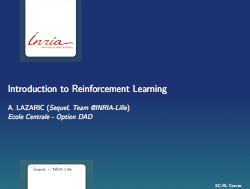Course on Reinforcement Learning
Abstract
Introduction to the models and mathematical tools used in formalizing the problem of learning and decision-making under uncertainty. In particular, we will focus on the frameworks of reinforcement learning and multi-arm bandit. The main topics studied during the course are:
-Historical multi-disciplinary basis of reinforcement learning
-Markov decision processes and dynamic programming
-Stochastic approximation and Monte-Carlo methods
-Introduction to stochastic and adversarial multi-arm bandit
-Approximate dynamic programming
Where and When
The course on “Reinforcement Learning” will be held at the Ecole Centrale de Lille. The room for lectures is B7-14 and for the practical sessions is C016.
Schedule
See hyperplanning.
Lectures
News
-
• Text of the first Homework: homework1-tree.pdf
-
• Text of the second Homework: homework2.pdf code.zip
-
• Text of the third Homework: homework3.pdf code.zip
-
• Schedule for the presentations: schedule.pdf
Proposed papers to review
RULES: Students should work in pairs and prepare a presentation of 15 minutes on two papers (one paper is also acceptable if particularly long) chosen in the following list.
-
•“An Intelligent Battery Controller Using Bias-Corrected Q-learning”
-
•“An Approximate Dynamic Programming Algorithm for Large-Scale Fleet Management: A Case Application”
-
•“A Contextual-Bandit Approach to Personalized News Article Recommendation”
-
•“Autonomous inverted helicopter flight via reinforcement learning”
-
•“Reinforcement Learning-based Control of Traffic Lights in Non-stationary Environments”
-
•“Optimizing Dialogue Management with Reinforcement Learning”
-
•“Coadaptive Brain–Machine Interface via Reinforcement Learning”
-
•“RL-MAC: a reinforcement learning based MAC protocol for wireless sensor networks”
-
•“Reinforcement Learning for Dynamic Channel Allocation in Cellular Telephone Systems”
-
•“Interactive Selection of Visual Features through Reinforcement Learning”
-
•“Approximate Dynamic Programming Finally Performs Well in the Game of Tetris”
-
•John Moody and Matthew Saffell. Learning to trade via direct reinforcement, 2001
-
•Beomsoo Park and Benjamin Van Roy. Adaptive execution: Exploration and learning of price impact
-
•Ying Tan, Wei Liu, and Qinru Qiu. Adaptive power management using reinforcement learning
-
•J. Mary, R. Gaudel, Ph. Preux, Bandits Warm-up Cold Recommender Systems
-
•





